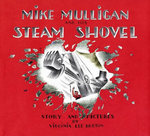- -
- “What! Another damned, thick, square book! Always
- scribble, scribble, scribble, eh, Mr. Gibbon?”
- —William Henry, Duke of Gloucester, on being presented with a volume of
- The Decline and Fall of the Roman Empire
-
From the time I was a small child, my brain got soaked with books. My mother read to me most every day, and a great many of my childhood memories are wrapped up in books: I can still recall my wide-eyed, frightened thrill to the old woman tossed in a basket, seventeen times as high as the moon, and I wanted Mike Mulligan and his Steam-Shovel (my earliest encounter with my Luddite tendencies) read to me over and over again. As an older child of six I pored over books about sailing ships, imperiously directing Mom to take notes.
 But I have never been a fast or a good reader. In my early grade school years I
never could keep track of which direction j’s and k’s and b’s and d’s
were supposed to face (a mild form of what we now call dyslexia, although then no one ever gave it a name), and words with similar numbers of the same types
of letters, such as except and expect, might as well
have been identical twins dressed in matching outfits for all I could
tell them apart; even words that are only second cousins visually, such as opinion and onion, could sometimes send my
conceptions veering abruptly off down the wrong path. (He stood on the
floor of Congress and proclaimed his onion? What?) On a large
page of small type with few breaks, it was not a rare event for me
simply to get confused, like a man dog-paddling in choppy gray waves at
night might become discombobulated and lose track momentarily of which
half of creation is water and which half air—sometimes I just had to
strike out for the landmark of the previous paragraph indentation, and
wade in again from there.
But I have never been a fast or a good reader. In my early grade school years I
never could keep track of which direction j’s and k’s and b’s and d’s
were supposed to face (a mild form of what we now call dyslexia, although then no one ever gave it a name), and words with similar numbers of the same types
of letters, such as except and expect, might as well
have been identical twins dressed in matching outfits for all I could
tell them apart; even words that are only second cousins visually, such as opinion and onion, could sometimes send my
conceptions veering abruptly off down the wrong path. (He stood on the
floor of Congress and proclaimed his onion? What?) On a large
page of small type with few breaks, it was not a rare event for me
simply to get confused, like a man dog-paddling in choppy gray waves at
night might become discombobulated and lose track momentarily of which
half of creation is water and which half air—sometimes I just had to
strike out for the landmark of the previous paragraph indentation, and
wade in again from there.
Age and experience have mitigated some of those difficulties, but exacerbated another. One of the less pleasant landmarks in my life as a reader was when a maxim I first saw on a needlepoint pillow hit home. I had seen the pillow in a shop window in the boutique town of Harbor Springs, Michigan, one hot summer day when I was a teenager. Surrounded by filigrees of pixelated needlepointed ribbon and flowers, the motto was, “So many books, so little time.”
Naturally, I immediately dismissed this as merely quaint and cute, as words rendered in needlepoint are intended to be. But I remembered it, and eventually I felt overcome by a strange fascination, and the unsettling profundity behind the homily began to fill me with dread. I realized that the future was not a limitless prospect, that my time on this earth really will be brutishly short, and that, no matter what I do, I must perforce depart this coil with books left unread. Many of them. A great many, in fact. This is obvious, of course; but when I first realized the truth of it in my heart, it oppressed me.
Every writer’s first duty, I have therefore concluded, ought to be to not write so damned much. There are already far too many books. They have been piling up for five centuries now, and although great books have been written in every age, quality, on average, is not improving. These days, especially, there seem to be as many people writing books as reading them, and those who write books write far too many. Have you ever taken a look at the Stephen King shelves at your bookstore? That fellow needs to haul in the reins and take a deep breath, if you ask me. He is in need of a good hobby, such as gardening, or watching NASCAR races on TV. Margaret Mitchell had a better idea: spend a long time writing one really good book, and then get out of the business.
 As a reader, I prefer slender books to fat ones, and fewer books in a writer’s output to more. I am grateful for Graham Greene, who put no more into most of his books than a steady reader can get back out of them again in a few days. I appreciate Jane Austen, who spent her entire life fussing over a mere six books—none of ’em too fat—because six books is not too many for me to read before I die. Where Jane Austen is concerned, I have two down, four to go, and high hopes.
As a reader, I prefer slender books to fat ones, and fewer books in a writer’s output to more. I am grateful for Graham Greene, who put no more into most of his books than a steady reader can get back out of them again in a few days. I appreciate Jane Austen, who spent her entire life fussing over a mere six books—none of ’em too fat—because six books is not too many for me to read before I die. Where Jane Austen is concerned, I have two down, four to go, and high hopes.
Charles Dickens’ David Copperfield is a great book—I have read the whole damned thing, from one cover to the other, I am eager for you to know—yet the man himself drives me to despair. I guess by definition his life was long enough for him to write all he wrote, but this amazes me, because my life cannot be long enough for me to read it all. Dickens must have kept quill and ink-pot handy at every moment of every day—at the breakfast table, in the bathtub, and while strolling in the garden. Geese must have trembled at his appearance, afraid their plumage soon would be pillaged to supply him with pens. Ink manufacturers must have beamed at their children in expansive self-satisfaction at the rightness of the world, thinking of Dickens. He surely wrote faster than some men can talk, not to mention better; and, at that, he must have lived a long and energetic life to write all he did and still have had time for things like meals, haircuts, and going to weddings.
Nowadays there is an additional criterion by which books are made and sold, besides poundage. Poundage still counts, however. A man named Dumas Malone, for example, wrote a biography of Thomas Jefferson that initially I felt would be good for me to read. It might in fact be a fine biography, not that I’d know: I later discovered that it would have taken me about as long to read about Jefferson’s life as it took Jefferson to live it in the first place. The one fat, thick, square book this Malone fellow scribbled was daunting enough, but when I had got a third of the way into it, and noticed that life seemed to be progressing very slowly for old Tom, I discovered, to my dismay, that there was a second volume as thick and square as the first, and then another one after that, and then more, stretching all the way into the distance. Six or eight books in all, or perhaps ten…it’s all the same.
I gave up without finishing volume one, glad that I hadn’t invested several seasons of my spare time accompanying Tom Jefferson down the many miles of his trail, the author and I stopping together to examine every twig at Tom’s feet.
I would like to read biographies of my betters, and can see the sense in doing it. But only if the authors would summarize.
The second criterion by which books are sold nowadays is that to all appearances, it seems that the less actual labor an author has logged, the better. The fashion seems to be to ensure that editors remain underemployed, their wallets thin, their wan and skeletal children drabbed out in secondhand clothes. Let an author earn a lot of money with one book, and the next one is sure to be gassy and long, suspiciously resembling a first draft, with writers’ darlings in it that any less parental an eye would have struck dead. The principle seems to be that a long line of words blurted out piecemeal is more desirable than a shorter line that is better considered, I suppose relying on the belief that genius has to well up and spill over, like an artesian well, and that water that must be drilled for cannot taste sweet.
Another cause behind this fashion—my guess is—is that nearly everyone goes to college now, never mind how illiterate or hostile toward learning he or she may be, and college English professors are in a position to command students to work hard doing things while reading that authors ought to have done while writing. This lulls authors into believing that clarity and purpose are not worth toiling for, since professors will drive their poor put-upon students to great labors hunting out the meagerest of authorial meanings in the densest of verbal thickets.
It seems to me a grave mistake to count on this, from the author’s side. Have you ever been in one of that endangered species of used bookstore in which sheer quantity is the only organizing principle? There are not very many such warehouse stores left, the advantage being that you will know it when you are in one. I got lost once in the old Powell’s, in Portland, Oregon. I can still remember how the place smelled. If you have gone to the vast musty half-dark mazes where the old fiction is warehoused, where shelves stretch down row after row into the darkness and rank upon rank until you have to lift your head up now and then to remember the points of the compass and the way out, then perhaps you have realized that you are in a graveyard, and that most of those old books have gone there to die. As in real graveyards, hordes of murmuring spirits from times past cluster there, thousands and thousands of them—young girls with their hearts set on a man and young men with their hearts set on glory; stock-company characters; travelers and stay-at-homes; the residents of towns, cities, and prairies; comedians, tragedians, ghosts, villains cruel and cunning to be o’ercome, discoverers and poets and inventors and matronly aunts and stern fathers and funny friends and sisters and brothers and schoolmates and neighborhood bullies and pets of every stripe—the repositories of ten thousand authors’ conjurings. And with many of those old books, it is possible that not a single person will ever read them again. How many of these neglected dusty books have people now even heard of? One in ten? One in a thousand? Five thousand? Think of that.
So if anyone is going to spend the hard effort it takes to write words, he or she, it seems to me, ought to ride the whole way into town instead of just four-fifths the way there, and finish up by polishing, taking out the words that don’t belong, lightening up on the reader’s load, and going as far as can be gone to help his or her tales make the long reach to posterity. Most books, after the first flush of interest they provoke has ebbed, are forgotten. Novels especially. Why tempt such a fate?
But then who am I to say? I never did graduate from college. The professors flogged me to extract deep subterranean symbolism from the books we read, and wanted everything related to serious political ideas despite the fact that I was not interested in politics at the time. Well, at least not the politics that consumed Turgenev, or Stendahl, or Richard Wright at the John Reed Club in 1936. Most of what I could decipher were the stories up at the surface, and stories, the truer the better, have generally been enough for me. I take it for granted that I should try to imagine the people in books as if they were, or had been, real. It seemed an obvious part of the compact the author and I had made—she by writing the story, I by picking up her book to read it.
But my real problem may be that I make headway against the tide too slowly. There are just too many great books. I do try. But I imagine that in the moment I meet my death, I will be halfway through a great book, feeling sorry that I could not reach the end.
________________
________________
Copyright 2007 by Michael C. Johnston—All Rights Reserved
bookstore picture from Postmodern Sass
________________
Support this site
Do you enjoy The Online Photographer? Any time you visit one of the following sites using the links below as a portal, we get a small commission for everything in any product category you might purchase during your visit, no matter how long you stay on their sites or how many pages you visit (and the prices are always the same to you either way). It's a nice and easy way to help enable T.O.P. to prosper while making your online purchases.




